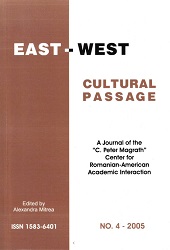The Dichotomy of Cultural Perspective
in George Eliot’s Daniel Deronda
The Dichotomy of Cultural Perspective
in George Eliot’s Daniel Deronda
Author(s): Charlotte FiehnSubject(s): Novel
Published by: Editura Universitatii LUCIAN BLAGA din Sibiu
Keywords: Daniel Deronda; George Eliot; cross-cultural traditions; cultural perspective in 19th -century literature; double-plot structures in Daniel Deronda; Jewish nationalism; identity in 19th;
Summary/Abstract: In her last novel, Daniel Deronda (1876), George Eliot demonstrates a profound, if uneven relationship between the traditions of the English upper classes and the culture of European Jews. Through the novel’s two principle characters, Daniel Deronda and Gwendolen Harleth, Eliot grounds her broader cultural dichotomy in the intimate relationship between two people who share an unusual experience of chance. Over the course of the novel, Eliot explores the chance nature of Daniel’s identity – his native Jewishness and his English nature – as well as Gwendolen’s misfortunes, which force her to undergo a profound test to her nature and represent for Daniel a mirroring of his own mother’s experience of oppression in marriage. Eliot explores identity, though, with an emphasis on the broader cultural differences that inform the characters’ positions. Although some critics and readers have questioned the compatibility of the more distinctly English elements with the Jewish plot lines, the aim of this essay is to demonstrate the significance of the dichotomy between the novel’s two plots and, more generally still, its two divergent cultural perspectives.
Journal: East-West Cultural Passage
- Issue Year: 14/2014
- Issue No: 2
- Page Range: 96-116
- Page Count: 21
- Language: English
- Content File-PDF

